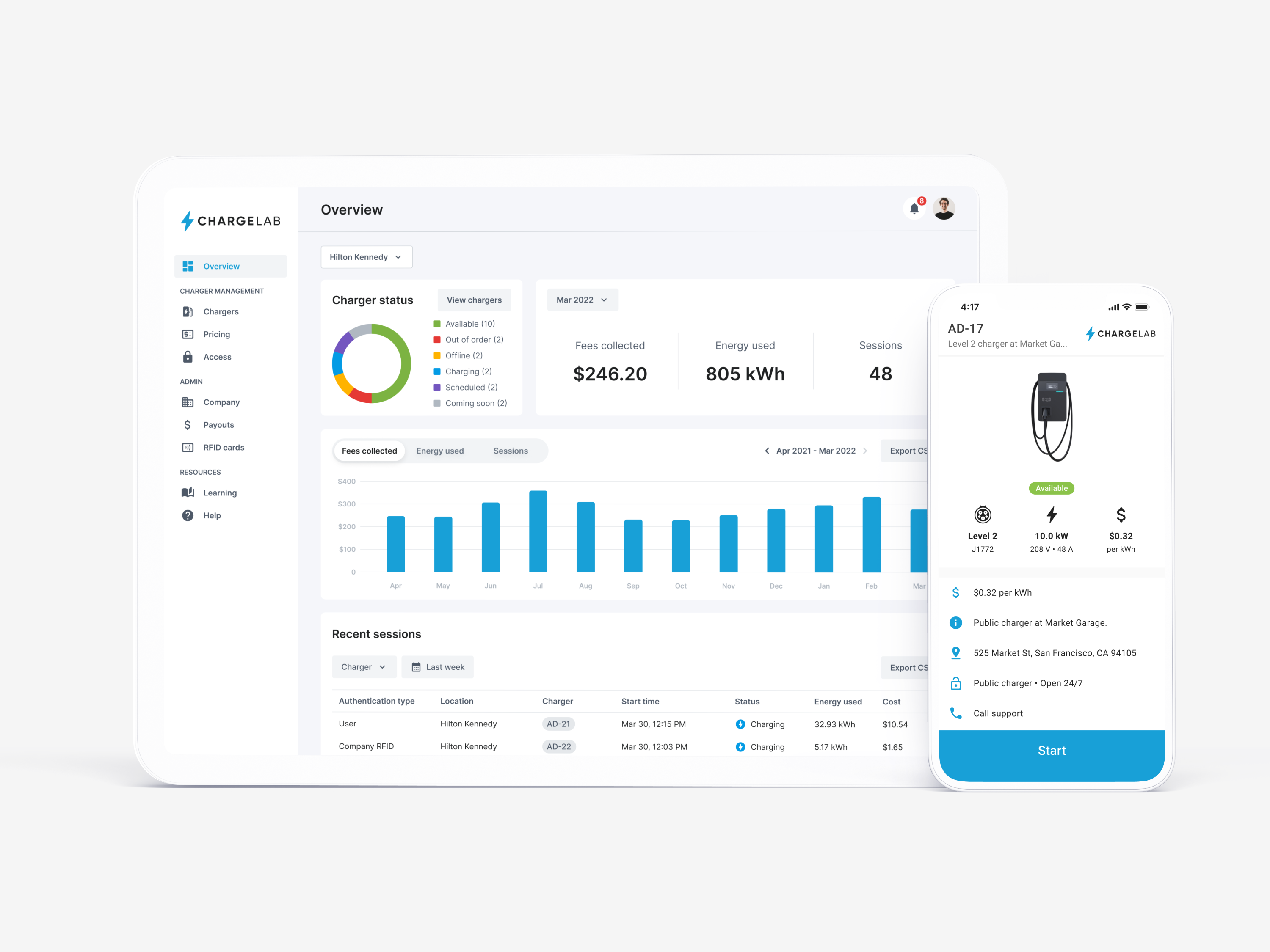Software solutions are a critical component when it comes to successfully running an electric vehicle charging business. But your ability to wade through the variety of EV charging software and platforms on the market will depend largely on your understanding of your system and the needs of both your management team and your end users. There are many different features to choose from, and different applications of EV technology will need some more than others. In this article, we’ll examine the most popular electric vehicle charging network applications and then explore how they map onto the six features you should look for in EV charging software and platforms.
Why do you need EV charging software?
The first step to finding the best electric vehicle software solution for you is to understand your use case. Before you can evaluate any platform’s features, you need to have a clear grasp of how you’ll be using the system. When you’re ready for best-in-class EV charging management software, ChargeLab can help. In the meantime, these are some of the most common applications that make critical use of EV charging software and platforms:

Fleet
From rideshare providers to shipping and logistics companies, keeping electric vehicles charged is just one of the important elements of running an eco-conscious fleet. EV software can help managers orchestrate the many moving parts that go into fleet management, every step of the way. Fleet managers need to be able to oversee both on-the-road events and what happens at unified depots or distributed charging points. That visibility allows them to ensure every vehicle is charged or has access to a charger, distribute power consumption to protect the grid, and optimize schedules to reduce costs as much as possible.
Multi-family
In multi-family environments, EV infrastructure has to cater to regular consumers living their everyday lives as opposed to professional drivers who are charging on the job. That means the EV charging software in place needs to be intuitive and user-friendly for residents of apartment buildings, multi-family homes, and other residential complexes. Access management is a critical way to make sure individual users can gain access and see accurate pricing, while also strengthening security protocols and deterring unauthorized users at specific charging stations or on the system overall.
Commercial
Commercial applications of EV charging networks are the broadest of these three use cases. Designed to be accessible to the public, the software supporting commercial charging systems has to combine high-level management capabilities with peak adaptability. In order to ensure both real-time usability and long-term sustainability of charging hardware, commercial managers should prioritize user management features, load balancing and energy oversight, in addition to a variety of robust and secure payment options.
6 top features to look for in EV charging software and platforms

#1: User management
User management is one of the few EV charging software features that applies to virtually every use case. No matter who is plugging into your EV chargers, how many users you’re supporting, or when and how they use your system, you need to be able to manage their access and facilitate their unique interactions. For many managers, the best way to tackle different user types is by sorting them into groups that receive predetermined permissions. This can help distinguish between residents, employees, public users, or any other configuration of access levels that’s appropriate for your business.
#2: Hardware management
Hardware monitoring allows managers to keep charging stations operational around the clock, so it also supports most EV infrastructure applications. Real-time notifications about network issues or faults with physical chargers allow for rapid response times that prevent noticeable service interruptions. For fleet managers and distributed charging network operators, broad compatibility is also an important hardware feature to look for; finding back-end software that works with most major charge point manufacturers will keep your operations centralized and streamlined no matter how much your EV charging stations business grows.
#3: Fleet operations
As its name suggests, the fleet operations feature is most relevant for the fleet application of EV technology. Managers need access to a central hub where they can oversee everything from individual vehicle or driver issues to delivery schedules and hardware monitoring at depots to user management across distributed charging networks. While managers working from corporate offices need full access to fleet-specific features, it’s also important for dispatchers, technicians, and drivers to have access to the fleet-related features that allow them to get their jobs done wherever they are.
#4: Energy management
Power consumption impacts EV charging hardware as much as it does a company’s bottom line. Energy management features should offer dynamic load distribution based on charger type, user level, and in-the-moment electricity prices to optimize the flow of electricity and the costs of continued service. Protecting the grid and preventing power outages is an added concern for multi-family and commercial managers, since the buildings their charging stations serve have electricity needs and energy protocols of their own.
#5: Payment processing
The ability to process payments reliably and securely is a key component for any publicly accessible EV charging network. Whether your users are residents, employees, frequent visitors, or one-time guests, your charging software needs to accept a range of payment options to support your income potential. User management also goes hand-in-hand with payment processing, since different user groups are often offered different payment plans or price points based on their usage or their association with your company.
#6: White labeling
White labeling is a priority feature for consumer-facing applications of EV infrastructure, since managers need to be able to provide their users with a fully branded experience. Residential properties, corporate facilities, and commercial centers can all benefit from putting their branding front and center, ensuring that users know they’re using a trusted system provided by an entity they’re already doing business with. As electric vehicles become a more popular and widely accepted way to combat climate change and protect the environment, EV network managers can also benefit from a reputation boost by associating their branding with the future of green energy.
When it comes to running your EV charging stations business, choosing the right software will be a function of your system’s unique needs. ChargeLab’s best-in-class electric vehicle charging management software is hardware-agnostic and custom-built to satisfy any number of popular use cases, from multi-family and commercial networks to full EV fleets. Contact us today to get started.




